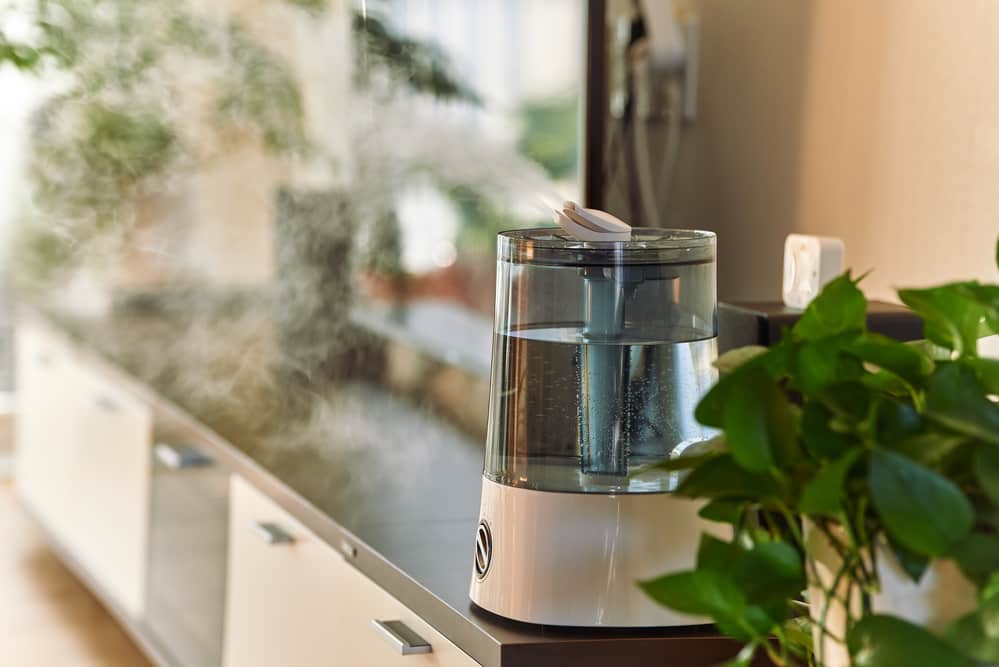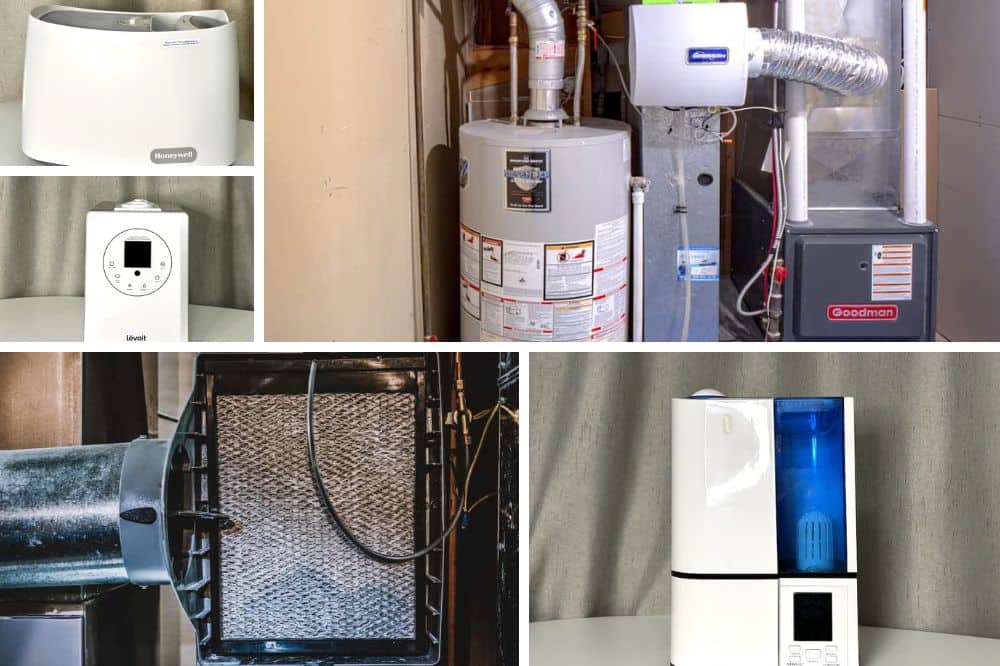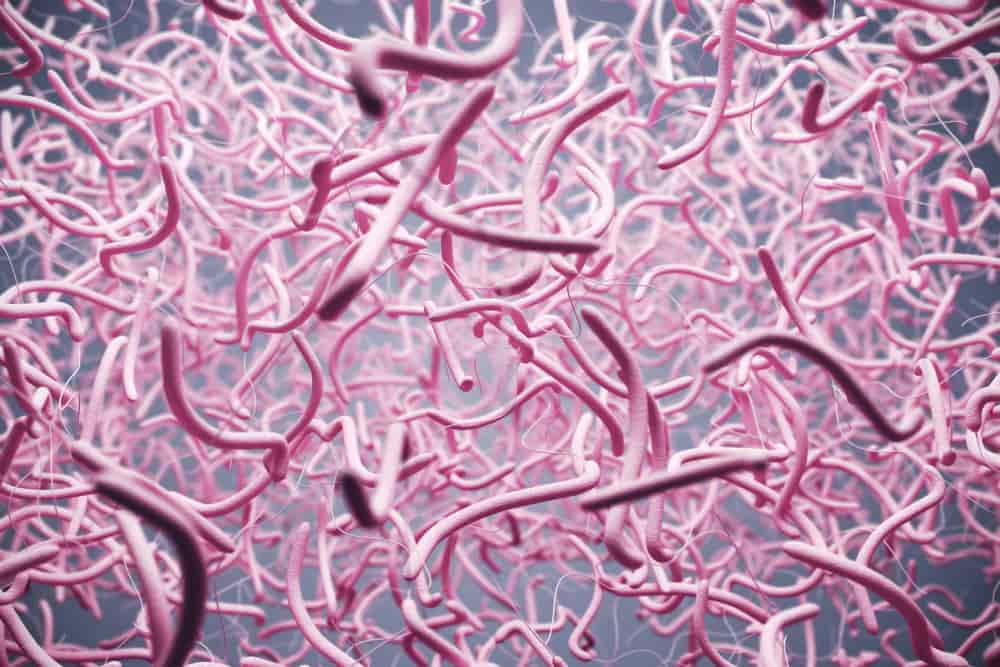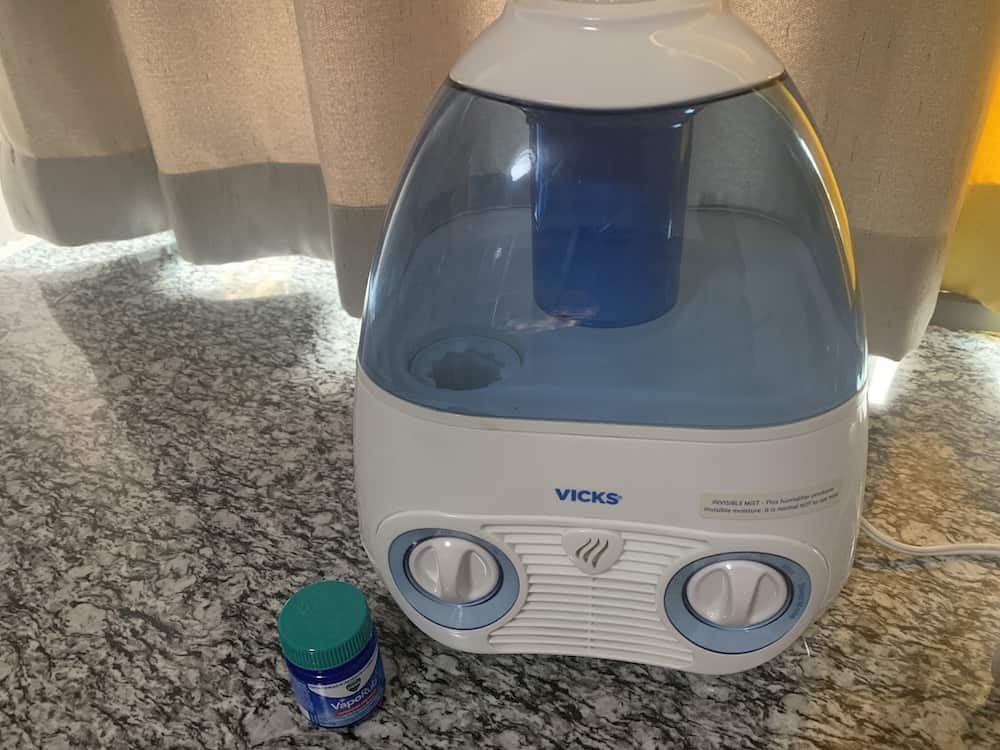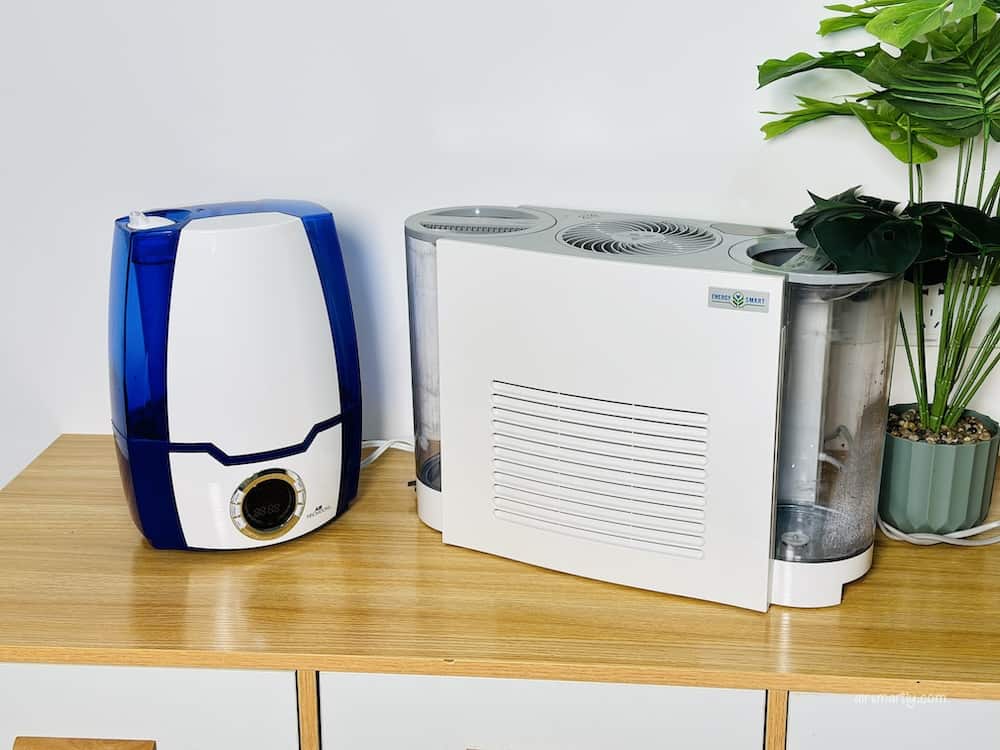Humidifiers are a staple in many homes, adding moisture to the air to prevent or treat dryness of the skin, nose, throat, and lips. These valuable small appliances are particularly beneficial in the colder winter months when dryer air sets from home heating systems.
Like many appliances, humidifiers require maintenance to continue operating safely and healthily. If not, things can go wrong. For example, the water in the humidifier tank can turn black.
If this happens to you, don’t be agitated! You can fix it with a breeze. The common causes of black water in a humidifier include black mold, mineral buildup, clogged filters, and impure water.
Continue to read so that you can understand why black water in a humidifier is dangerous and how to fix it on your own!
Why Is the Water in My Humidifier Black?
Usage of a humidifier has a variety of benefits. You may be reliant on your humidifier to keep your household or workplace healthy in the winter months. Office workers report a reduction of allergy symptoms when humidifiers are present. Having one in your baby’s nursery can help them feel more comfortable and less irritable.
However, lurking in the humidifier’s reservoir may be illness-causing toxins and irritants. Black humidifier water indicates the presence of black mold, mineral deposits, or other foreign bodies.
Whether your humidifier water is filled with black sludge, dotted with black spots, or gray-tinged, the reasons and preventions are simple.
Reason 1: Black Mold in the Humidifier
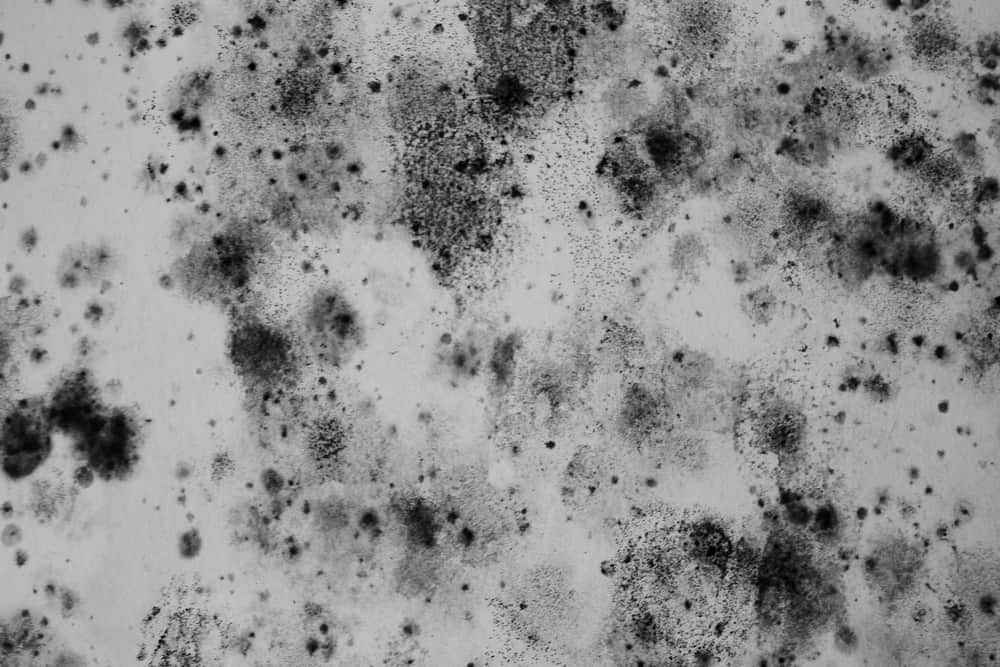
Black mold is the most likely cause of dark black water in your humidifier. Homes with high humidity have a much higher chance of mold growth. Black mold may create a sludge on the water’s surface, and the sludge may also build on the sides of the reservoir. Alternatively, the black mold may appear as tiny spots in the water.
What Is Black Mold?
The black mold most likely found in your home is known scientifically as Stachybotrys chartarum. This fungus can produce toxins and irritants with a wide variety of effects on the human body. Many homeowners encounter black mold when dealing with flood damage or burst pipes. While black mold is very rarely lethal, it can still trigger a host of health issues.
How Does Mold Get Into Humidifiers?
Household molds will often grow in spots with lots of moisture. Leaky roofs, poorly sealed windows, or old pipes serve as ideal spots for mold to grow. Mold can also grow on papery material, like cardboard or drywall, and you can even find Fungi in the fabric of the furniture. The humidifier’s warm, moist interior is an ideal place for fungi and bacteria to grow.
What Other Molds Can Grow in Humidifiers?
In addition to black mold, you may also see brown or green specks. These may also be spores that pose a potential threat to your air quality. You can also find pink mold in a humidifier. All of these are capable of changing the color of humidifier water into dark, unpleasant sludges.
How To Prevent Mold
Any chemicals used during the cleaning process should have antifungal properties. Usually, vinegar nor hydrogen peroxide is able to clear the black residue away effectively.
Beyond regular cleanings, humidifiers should be fully cleaned, drained, and dried before storage. Stagnant water is a prime place for germs to grow, especially when stored in the dark.
Reason 2: Mineral Deposits in the Humidifier
Mineral buildup in the machine can look like particulate gathering on the sides of the humidifier. Mineral deposits may also look light brown with visible flakes.
When wiping out the humidifier, mineral buildup will feel distinct from mold, and minerals will have a gritty texture instead of the slimy texture of fungus.
How Do Mineral Deposits Build Up Inside Humidifiers?
Minerals predominantly originate from hard water, and tap water can contain a variety of dissolved sediments that are left behind when the water turns into steam. The most common minerals in hard water are magnesium and calcium, and these minerals can leave residues behind in many contexts. Another possibility is that the humidifier’s heating elements have begun to degrade.
How To Prevent Mineral Buildup
Always use distilled water for the humidifier. Hard water from the tap will accumulate buildup over time and shorten the lifespan of your machine. Consult the owner’s manual on whether the device itself shedding particles is considered normal.
Reason 3: Impure water
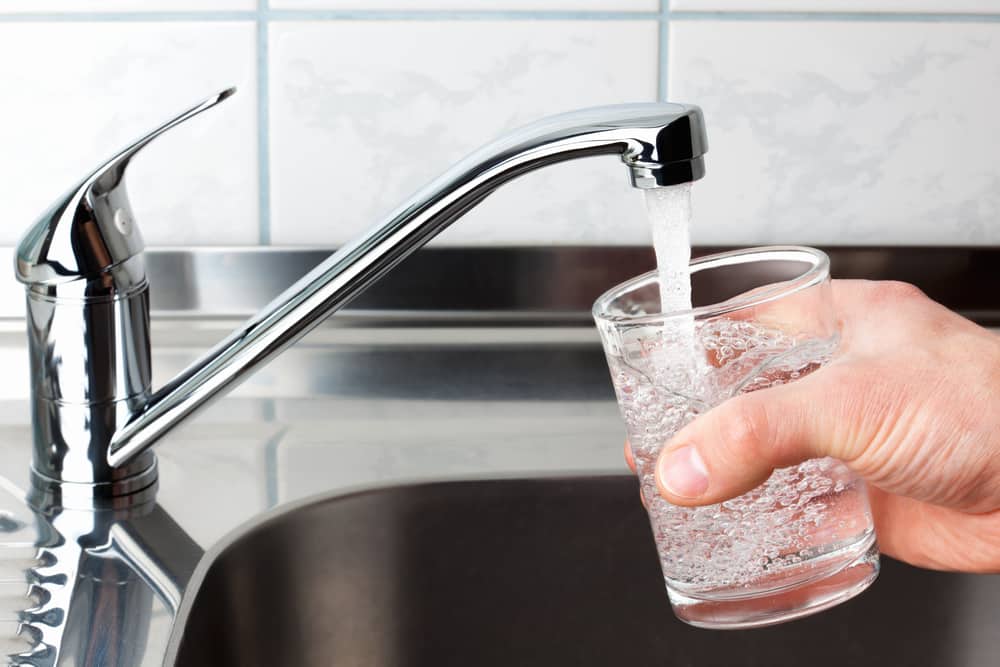
Sometimes, you can still see black water after cleaning up the mineral buildup and mold. It may be due to the water source you use.
The tap water is of low quality in some areas, and the water supply pipe may be contaminated with rust and mold.
In this case, you should use bottled water or distilled water instead and don’t drinking tap water anymore.
Reason 4: Clogged filter
Many whole-house and console humidifiers use wicks and filters to filter out the mineral, debris, and some bacteria.
With time, these filters can be clogged and break down eventually. These microorganisms can grow and thrive inside of them, leaving black spots on them and turning the water black.
The solution is to dispose of it, clean the humidifier and put a new replacement into your humidifier.
Can Black Water in Your Humidifier Make You Sick?
A dirty humidifier can pose a significant health hazard. The tissues of the lungs are delicate and sensitive to foreign irritants. As many parents keep humidifiers in nurseries, it is also vital to note that children are susceptible to respiratory illnesses.
Airborne Dangers
Some germs pose a minor threat to humans as they struggle to get past our natural defenses, like our skin. However, if they can grow in the warm, moist humidifier reservoir, they can become aerosolized. These airborne germs can go directly to your lungs when inhaled, giving these diseases a much higher than average chance to cause illness.
Potential Black Mold Health Hazards
Breathing in black mold can trigger multiple illnesses and conditions. Lung damage, eye damage, bone marrow disease, and skin conditions link to black mold ingestion. Symptoms of black mold infections include vomiting and bleeding from the mouth.
Bad For Immunocompromised People
Immunocompromised people, such as recipients of organ donations and sick children, are especially at risk of illnesses caused by improper humidifier maintenance. To people already at risk for severe disease, the presence of black water in the humidifier maybe even more dangerous.
How To Prevent Humidifier Water From Turning Black?
The water within a humidifier should always be clear, and if it ever becomes cloudy or contains color, it requires maintenance.
Though the dangers of black water in the humidifier are numerous, regular maintenance of your machine can quickly negate any health issues. Regularly cleaning your humidifier is the best way to keep the water from turning black.
How To Clean a Humidifier
- Unplug the device. Never perform maintenance on a running machine.
- Empty the reservoir thoroughly. Dry with a microfiber cloth or paper towel.
- Mix an antifungal chemical with water. Hydrogen peroxide is a strong chemical that can destroy mold. For those looking for a natural alternative, vinegar can be used instead. Use 1 part chemical for every 10 parts of water.
- Pour the mixture into the humidifier and let sit for 30 minutes.
- Drain the humidifier again. Scrub the interior with an old toothbrush or any other tough scrubber that can be fully disinfected afterward.
- Rinse all parts of the humidifier. Any components that may seem unsafe to put under running water should be cleaned with a multi-purpose disinfectant.
- Reassemble the humidifier. If the humidifier will not be turned on immediately, store it completely dried off.
Will Buying a Specialized Humidifier help to prevent black water?
There are many types of humidifiers. Though there are a variety of models that advertise themselves as ‘germ-free’ or ‘anti-microbial’, there is little scientific evidence to support these claims. Part of owning any appliance is regular maintenance and cleaning, especially one that, ultimately, comes into contact with the interior of your body.
Mold and Mineral Buildup Are The Main Culprits Of Turn Your Humidifier Water Black
The dangers of discolored water in the humidifier reservoir are many, but your humidifier can continue to hydrate your air without the risk of cleaning and maintenance. Black water in the humidifier is a serious but easily remedied issue.
Mold, germs, and minerals can accumulate in any humidifier. Cleaning out these irritants when discovered and exercising regular cleanings will prevent buildup in the future. Use antifungal cleaners and distilled water to best ensure the safety of the people around you and extend the lifetime of your humidifier.

